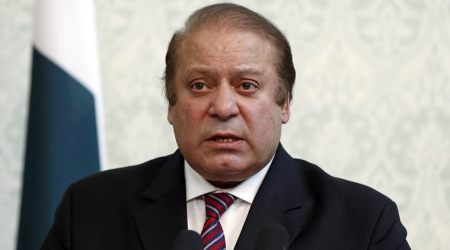 Pakistan Prime Minister Nawaz Shari.
Pakistan Prime Minister Nawaz Shari.
Pakistan repeats history of not letting governments or prime ministers complete their term. This time around it was done through invoking the People’s Representation Act, 1976 that punishes for non-disclosure of assets and doesn’t allow a prime minister to hold an office of profit while he is the head of government. In Nawaz Sharif’s case, he had a work permit of a company registered in the UAE.
However, the story doesn’t end here. The five-judge bench of the Supreme Court have also sent all cases against Sharif’s corruption to the country’s primary anti-corruption body, the National Accountability Bureau (NAB) where investigations will be conducted against Sharif and his entire family including his daughter and political heir, Maryam Nawaz and Sharif’s finance minister, Ishaq Dar, who also happens to be the father-in-law of Sharif’s other daughter. The NAB has been instructed to conduct an inquiry through a Joint Investigation Team (JIT). It is possible that the new JIT will also have the same composition as the earlier one which means officials from NAB, the Federal Investigation Agency (FIA), ISI and MI.
Moreover, since the highest court has expressed its displeasure with the current NAB chairman, these investigations will be monitored through a special committee. If proven guilty, articles 62 and 63 of the 1973 Constitution will apply, which means that Sharif and his family will be proven not to be sadiq (truthful) and ameen (honest) and hence unable to hold any political office. This was an addition introduced to the Constitution by the former military dictator General Zia-ul-Haq.
Clearly, the implications for Sharif and Pakistan range from short to longer-term. Shahbaz Sharif, Nawaz’s brother, is the new prime minister. But there are longer-term implications for Nawaz Sharif as this time non-parliamentary and non-elected institutions of the state are determined to end his political legacy by ensuring that his daughter Maryam Nawaz cannot enter politics in future, and possibly drag the family from riches to rags. According to the grapevine, the NAB has made informal estimates of Sharif’s assets to be in billions of US dollars. The Supreme Court has already ordered NAB to investigate Sharif and his children’s assets inside and outside the country. Corruption investigations are complicated and difficult. Given the media trial that is likely to accompany the investigation, the aim will be to totally decimate Nawaz Sharif to a point he totally surrenders. There is little possibility that Sharif, who has health issues as well, would be able to start a political career again or pass on the mantle to his progeny. Stripped of his wealth he may not even be able to invest in his grandchildren that would give hope to his supporters like the small trader from Lahore whose abrupt comment on the decision was “Nawaz ko hakoomat sey tu nikaal diya, dil sey kaisey nikalo gey” (you have kicked Nawaz from the government but how will you take him out of our hearts).
Indeed, there are many who were not entirely unhappy with Sharif and were ready to vote him into power a fourth time in 2018. But it is not sure that the election will be conducted next year according to schedule. Given the ongoing investigation and many other issues, there is a possibility that elections might get delayed and the country run through an interim setup that may be there for longer than the stipulated three months. The delimitation of constituencies on the basis of the recently completed census that is not entirely beyond controversy will be one of the reasons for a possible delay. The formula for a national government that may be empowered to carry out certain reforms is much talked about. Whatever the end goal of such a structure, it will certainly be a method to discipline the political system of the state and bring it in line with the overall expectations and narrative of the non-parliamentary elements. Although the more popular narrative in the country at the moment is that a new map is being drawn to eliminate corruption, it is questionable if the process would not be selective. In any case, the national accountability ordinance excludes the judiciary and military from this process.
Not that it is easy to absolve Sharif from his sin of amassing unaccounted for wealth. However, his departure is likely to be a great setback in terms of even marginal chances of peace and stability in the South Asian region. There is very little likelihood of an interim government being in full control of foreign policy or taking any peace initiative vis-à-vis its neighbours or certain other critical powers like the US. While many believe that Sharif put his eggs in the wrong basket by hoping that China would protect him since he made great achievement in pushing for the China-Pakistan Economic Corridor (CPEC), the fact is that Sharif was immaterial to developments vis-à-vis Beijing. Pakistan is now back to its traditional policy framework. The only question that remains is when will a next government get elected and if Imran Khan gets a chance to be in office.

